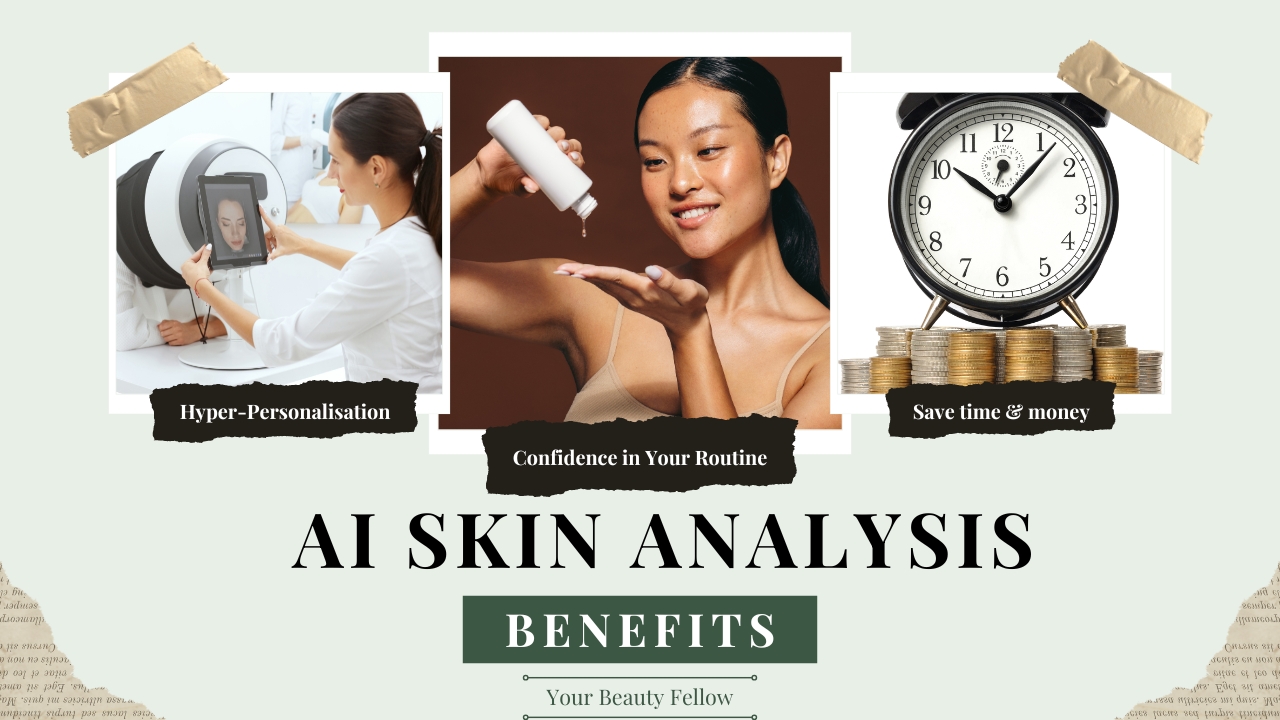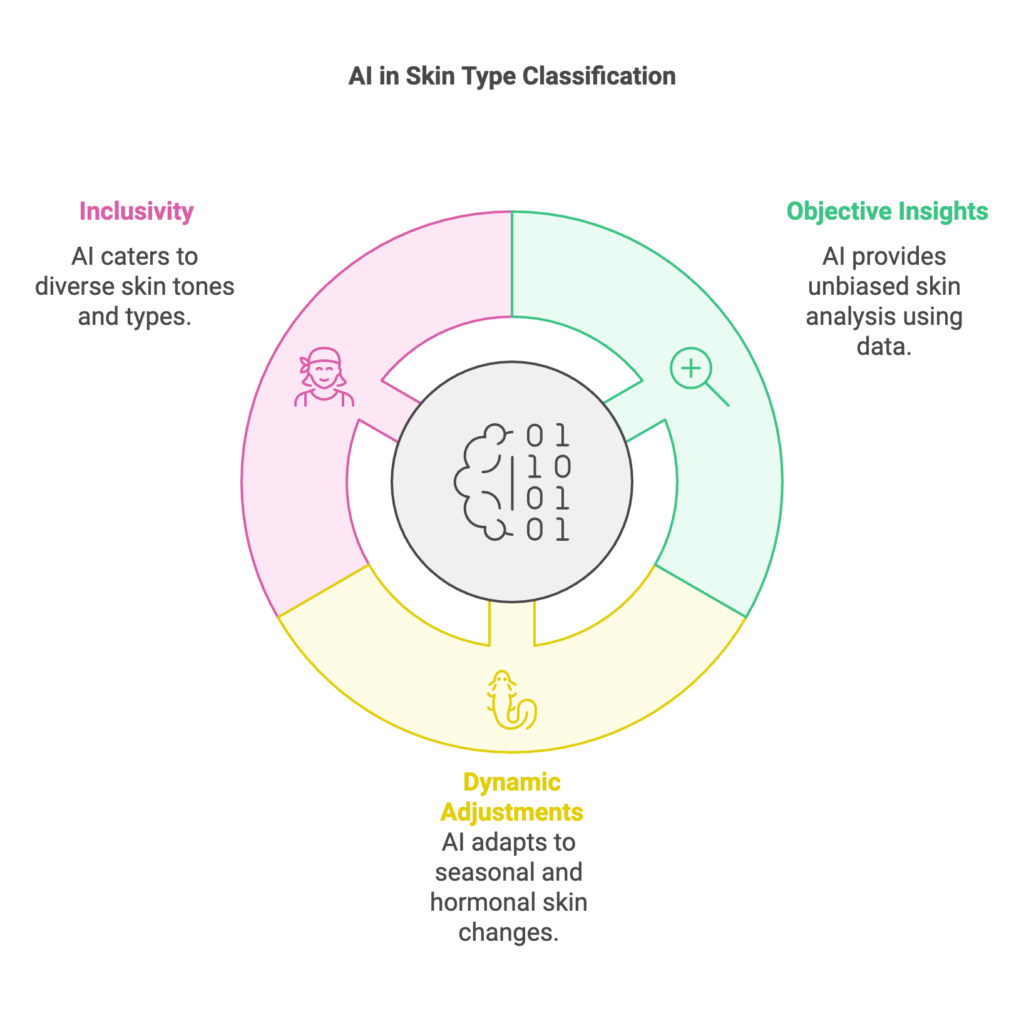
Have you ever wondered why some skincare routines work wonders for others but leave you disappointed? The secret to clear, radiant skin begins with truly understanding your skin’s unique characteristics. But in a world filled with generic advice and endless product options, finding that understanding can feel overwhelming.
That’s where AI skin analysis comes in—a game-changing innovation that helps you decode your skin’s needs with precision. By incorporating AI tools into the first two steps of the CLEAR Skin Framework—Classify your skin type and Learn its unique needs—you can take the guesswork out of your skincare journey. Let’s dive into how this works and why it’s the future of building a hyper-personalised skincare routine.
What Is AI Skin Analysis?

AI skin analysis refers to advanced technology that uses machine learning and data algorithms to evaluate your skin’s condition. By analysing images of your face or answering detailed questionnaires, these tools assess factors like:
- Skin type (dry, oily, combination, or sensitive)
- Concerns (acne, pigmentation, fine lines, etc.)
- Skin tone and texture
- Hydration and oil levels
- Pore size and visibility
- Potential irritations or sensitivities
The result? A detailed report that offers insights you might miss on your own, helping you make smarter decisions about your skincare.
Step 1: Classify Your Skin Type Accurately

Understanding your skin type is the foundation of effective skincare. Without this knowledge, even the most expensive products can fail to deliver results. Here’s how AI analysis tools make this process more accurate:
1. Visual Precision
AI-powered tools use high-resolution imaging to detect subtle variations in your skin that may not be visible to the naked eye. For example, they can identify dry patches or excess sebum production that signal combination skin.
2. Dynamic Analysis
Unlike traditional methods that classify skin into static categories, AI tools account for how your skin changes over time—whether due to hormonal fluctuations, seasonal changes, or lifestyle factors.
3. Personalised Recommendations
Many AI platforms recommend specific routines, active ingredients, or product types based on your skin classification. This takes the trial-and-error guesswork out of skincare.
Step 2: Learn Your Skin’s Unique Needs
Once you’ve classified your skin type, the next step is to understand what your skin truly needs. Skincare isn’t just about solving one problem—it’s about nurturing your skin as a whole. AI tools excel here by providing:
1. Detailed Skin Assessments
AI platforms analyse multiple layers of your skin to pinpoint specific concerns, such as:
- Early signs of aging like fine lines and wrinkles
- Hidden pigmentation beneath the surface
- Acne-prone areas and their triggers
- Areas of dehydration versus oiliness
2. Ingredient Insights
One of the biggest challenges in skincare is understanding how ingredients interact with your skin. AI skin analysis can identify:
- Ingredients you should prioritise, like niacinamide for redness or salicylic acid for acne
- Potential irritants based on your skin sensitivity
- Ingredient combinations to avoid
3. Data-Driven Progress Tracking
AI tools don’t just offer one-time analysis; they help track your progress over time. You can monitor improvements and adjust your routine based on real data, ensuring long-term success.
The Benefits of AI Skin Analysis
1. Hyper-Personalisation
No two people have identical skin. AI tools provide insights tailored specifically to your skin type, concerns, and goals.
2. Time and Money Savings
Instead of wasting resources on trial-and-error, AI-guided recommendations ensure you invest in products and routines that work for you.
3. Confidence in Your Routine
Armed with precise data, you’ll feel empowered to make informed decisions, eliminating the frustration of skincare guesswork.
Popular AI Skin Analysis Tools
Although the market for AI skin analysis is still growing, several platforms are leading the way:
• MySkin by Cetaphil: An innovative AI-powered skin analysis tool designed to provide personalised skincare routines.
• L’Oréal Skin Genius: Combines advanced AI with product recommendations from the brand’s portfolio.
• MyRoutine AI Skin Analysis Tool: A skincare tool that provides personalised skincare routines based on a photo you upload.
• Neutrogena 360: Refers to the Skin360® technology, which is a tool and app developed by Neutrogena that uses advanced technology to scan your skin.
These tools exemplify how technology can bridge the gap between understanding your skin and achieving your skincare goals.
Why AI Skin Analysis Is a Game-Changer for the CLEAR Skin Framework

The CLEAR Skin Framework emphasises a systematic, science-backed approach to skincare. By integrating AI skin analysis into the Classify and Learn steps, you gain the tools to:
- Accurately identify your skin type and concerns
- Understand what ingredients and products will work best for your unique needs
- Build a solid foundation for a hyper-personalised skincare routine
When combined with the other steps of the CLEAR Skin Framework, this sets you up for long-term success.
Your Next Steps
Ready to take control of your skincare journey? Start by exploring AI skin analysis tools to classify your skin type and learn its needs. These first steps will guide you toward a routine that’s not just effective but tailored specifically for you.
In our next article, we’ll show you how to Establish and Assemble your skincare routine using this newfound knowledge, ensuring every product and step aligns with your skin’s unique needs.
With AI tools and the CLEAR Skin Framework, achieving your skin goals is no longer a matter of luck—it’s a matter of strategy.
The path to better skin starts today. Are you ready to take the first step? Download the FREE Workbook Now!
Frequently Asked Questions
How Accurate Are AI Skin Analysis Tools Compared to Professional Dermatologist Assessments?
AI skin analysis tools are remarkably precise, using advanced machine learning algorithms to detect subtle skin variations. While they can’t completely replace professional dermatological consultations, these tools offer 80-90% accuracy in skin type classification and concern identification. They provide detailed, data-driven insights that help users understand their skin’s unique characteristics and make informed skincare decisions.
Can AI Skin Analysis Help People with Sensitive or Complex Skin Conditions?
Absolutely! AI skin analysis excels at identifying nuanced skin characteristics, especially for those with sensitive or complex skin. By analysing multiple skin layers and factors like hydration, texture, and potential irritants, these tools can pinpoint specific sensitivities and recommend tailored skincare strategies. They’re particularly useful for tracking changes over time and suggesting ingredient combinations that minimise potential reactions.
Is My Personal Data Safe When Using AI Skin Analysis Platforms?
Most reputable AI skin analysis tools prioritise user privacy and data protection. They typically use encrypted platforms and anonymise personal images and information. However, it’s crucial to review each tool’s privacy policy carefully. Look for platforms that offer clear data usage guidelines, allow image deletion after analysis, and provide transparency about how your skin data is stored and processed.
How Often Should I Use AI Skin Analysis Tools to Track My Skincare Progress?
For optimal results, use AI skin analysis tools every 4-6 weeks. This frequency allows you to capture meaningful changes in your skin’s condition while avoiding over-analysis. These tools can track improvements in texture, hydration, and specific concerns like fine lines or pigmentation. Regular check-ins help you understand how your skincare routine impacts your skin and enable data-driven adjustments.
Are AI Skin Analysis Tools Effective for All Skin Tones and Ethnicities?
Leading AI skin analysis platforms are increasingly developing algorithms that accurately assess diverse skin tones and ethnicities. Advanced tools now use extensive, inclusive datasets to ensure precise analysis across various skin types. However, it’s essential to choose reputable platforms that demonstrate commitment to diversity and have tested their algorithms on representative population samples to ensure fair and accurate assessments.
What’s the Difference Between AI Skin Analysis and Traditional Skin Type Assessments?
Unlike traditional assessments that rely on visual inspection or generic questionnaires, AI skin analysis uses machine learning and high-resolution imaging to provide dynamic, multi-layered skin insights. These tools can detect subtle variations, track changes over time, and offer personalized recommendations based on complex data algorithms. Traditional methods often provide static, one-dimensional evaluations, while AI analysis offers a comprehensive, evolving understanding of your skin.
Can AI Skin Analysis Tools Recommend Specific Skincare Products?
Many AI skin analysis platforms offer personalised product recommendations based on your unique skin profile. By analysing your skin type, concerns, and sensitivity, these tools suggest compatible ingredients and product types from various brands. Some platforms are brand-specific, like L’Oréal Skin Genius, while others provide more neutral, targeted recommendations to help you build an effective, tailored skincare routine.






